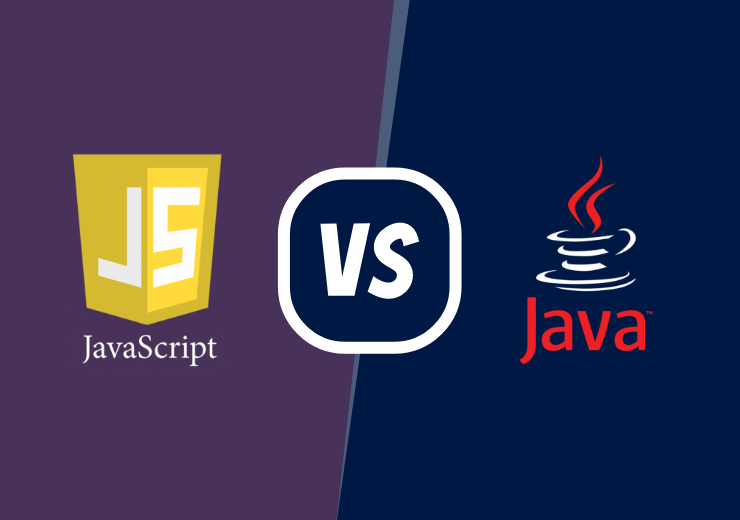Like Java & JavaScript, the languages will always be opposed. It all begins with the name. JavaScript was condemned to be forever confused as an expansion to Java and frequently confused with Java. Even now, in the year 2021. However, this does not rule out Java and JavaScript entirely. These two languages challenge the title of most utilized and in-demand coding language in the world, with around 7 million and 12 million developers globally, respectively.
As a result, it’s logical for new programmers to compare Java with JavaScript when deciding which language to learn first. Java vs. JavaScript Which Is the Best Learning Option in 2022? And this is not a decision to be taken lightly. The language you choose will likely determine the rest of your career path in software development. Understanding the distinctions and similarities between these languages is crucial. But first, a little primer in both languages and also if java and javascript are similar.
Meet Java – The Choice Of Today’s Developer
Java has long been the leading choice in the corporate and mobile industries and will remain so soon. Java, one of the world’s most flexible programming languages, is now employed practically across systems, technologies, and economic sectors. It is now the most widely used back-end language of programming in mobile development (mainly for Android), as well as in cloud-based systems and various other hot and growing tech sectors like IoT and Big Data.
The need for Java developers is extremely strong year after year. Today, the total number of Java developers worldwide exceeds 7 million (according to various reports, there are 6.8-8 million Java coders in the globe), placing it third only to JavaScript and Python.
According to a recent analysis by the research firm Flaming Glass, Java Developer is the most frequent IT job in the United States. Interestingly, one survey discovered that among all experts in general, not just those in the computer industry, Java developers are the most likely to leave their careers. Java is also the most in-demand technical talent in general.
Their profession rate is less than 8%, compared to 27% for the software development profession and 35% for system admins, for example. Even when given a higher-level administrative role, most Java developers refuse to go. This might be the best indication that Java programming is the proper career path for most developers.
Amazing Java Features
Java has been here for a while, and as a result, it has a vast community with many tools and instructional information linked to the language. It is on par with or quicker than most other recently compiled languages and far faster than a programming language, making it an excellent choice for strong native applications.
Unlike JavaScript, Java is a multi-threaded language, which means it can accomplish numerous tasks simultaneously rather than waiting for one operation to finish before starting the next. Java is quite secure and is usually JavaScript for java programmers. It includes private procedures and variables to prevent unwanted access to the entire data and functionality. Furthermore, the built software runs in a virtual machine that is isolated from the actual device on which it is operating.
What Are The Many Uses Of Java?
Java can be used to develop almost any desktop program, mobile app, game, site back-end, or server, and it can even operate machines. When you search on Wikipedia’s website or app, Java executes searches and handles the technologies in Mars rovers. Twitter, Netflix, Google, and numerous well-known technology businesses use Java in different forms as JavaScript is easier than Java.
Advantages Of Java Programming Language VS Javascript
Java is one of the most extensively used programming languages for various reasons. Java is designed to be simple to use, making it easier to build, debug, and learn than other languages. It is also object-oriented, allowing you to develop modular applications and reusable code. Java’s platform independence is one of its most significant features.
It can readily transfer from one computer network to another. Java is a strong programming language. It has become a primary language for developing the internet of things since it is simple to use, platform-neutral, and offers security features. Also, don’t miss taking advantage of reading our latest article focusing on the Top 13 Android Development Trends in 2022.
Disadvantages Of Java
Despite having some amazing advantages – the programming language does come with some twists like the following and will explain how to use Java in Javascript:
(1) Security Vulnerabilities
Although Java has been around for a long time, security experts and hackers are aware of the language’s inherent weaknesses. Java programmers must be cautious in following security best practices such as updating tools, libraries, and frameworks.
(2) Memory Draining
Java is infamous for its huge storage requirements—the cost of thread-level parallelism is that each process gets a set amount of memory for its stack.
Now Meet JavaScript – The Undisputed Monarch
JavaScript is the undisputed monarch of modern front-end development. It initially got launched in early 1996 during the “first browser war” between Microsoft’s Internet Explorer and Netscape’s Navigator. And thus, is now the most obvious choice for developing interactive front-end apps due to several advantages. It is a high-level, multi-paradigm programming language. It became particularly popular in the late 2000s with the advent of NodeJS, a JavaScript-based run-time environment. And this made developers learn java vs javascript.
Node.js enables developers’ server-side & client-side scripts in the same language, allowing them to create dynamic web content on the server before sending it to the user’s web browser. Another major tool that keeps JavaScript so popular and widespread in website development these days is AngularJS, a JavaScript-based website development framework. Today, JavaScript is the world’s most widely used programming language, with over 12 million developers.
How Is Javascript Different From Java?
JavaScript offers important characteristics that have led to its extensive use. It runs in the browser without pre-compiled, a just-in-time compilation technique. All major web browsers use the language. Many of the activities you have seen on websites are due to it, such as obtaining new data without refreshing the page, animation, checking forms for mistakes, chatting, publishing comments, and more.
The Unique Uses Of JavaScript!
According to W3Techs, JavaScript will be utilized by 98% of all sites by June 2022. As to First Site Guide, there are about 1.93 billion sites on the internet today. That’s quite a bit of JavaScript. It can transform a static marketing materials website into a working application that runs in your browser.
But it’s not just for the front end. Node environments support JavaScript, enabling you to develop JavaScript for the back end. Node allows you to have a complete JavaScript stack.
It can execute routing, control functions, API services, or all these functions at the same time. JavaScript may also be used to create games. It is especially well-suited for mobile and internet games, which means you may create games for nearly any platform.
Benefits Of JavaScript
JavaScript’s ability to operate in a browser is a huge benefit. It’s why it’s been the most popular language in the GitHub project for several years. Web browsers are available on a wide range of devices. Browsers are available on all laptops, desktop computers, tablets, & smartphones, as well as on numerous gaming consoles and smart TVs. Regarding web development, JavaScript is a good choice due to its incredible adaptability.
Being a full-stack developer no longer needs knowledge of many languages. You must be familiar with many concepts, patterns, and paradigms, yet just one syntax is required to bring everything together. Because of JavaScript’s popularity & pervasiveness, there is a lot of educational material available. You may discover books, films, courses, articles, and podcasts in nearly every aspect of technology. Finding someone with the knowledge you require to complete your task is not difficult.
Shortcomings Of JavaScript
As stated above, java vs javascript is better – the benefits also follow suit with certain disadvantages as well – which we have stated below:
(a) Single-Threaded
A single thread executes the JavaScript event loop. While suitable for most browser-based web applications, the languages lack developed support for concurrency & multithreading.
(b) Distinct Point Of Failure
Because JavaScript operates on a singular event loop, a single flaw can cause all JavaScript coding on a web page to stop working.
Major Similarities Of Java Vs. JavaScript
Despite their differences, there are certain top-level commonalities worth examining, particularly when comparing Java to JavaScript in web development.
1. An Object-Oriented Design (OOP)
Both languages demand the developer write code regarding the objects and their connections. As a result, both languages have access to inheritance, encapsulation, and polymorphic methods.
2. Front-End Programming
Both languages have applications in front-end development. Inset JavaScript in HTML, develop it as a system or library, or utilize it as a Java applet.
3. As a Front-End Development
Java has long-powered back-end technologies such as JBoss, Apache, and WebSphere. Node.js has evolved into a platform for JavaScript-powered applications. Support is available for both of these programming languages.
Java Vs. JavaScript
Nowadays in the IT industry, both Java & JavaScript are playing an important role. The following section will compare the two languages to understand them better.
1# Object-Oriented Programming
Object-oriented programming languages include Java and JavaScript. The two frequently employ concepts like encapsulation, polymorphism, inheritance, & abstraction. To carry out activities, both languages make use of objects and classes. The sole distinction between the two is that Java is a programming language, whereas JavaScript is a scripting language.
2# Variable Defined
Java is a strong programming language. Before you use it or deploy it – define all variables in the program. In contrast, JavaScript is a static language. You need to create Variable declarations as soon as you utilize the variables.
3# Syntax
Java employs syntax comparable to that of C or C++. JavaScript’s syntax is identical to that of C / C++. Because both languages use classes and objects, the syntax is very similar.
4# Running Platform
The Java Virtual Machine is where Java programs and applications run (JVM). This is often deployed along with the Java Software Development Kit (SDK). JVM gives a platform. During execution, it analyzes the byte code. Involve JavaScript in a web browser. They don’t need any initial configuration.
5# Compilation
Java is compiled as well as interpreted. Every Java application is first restored to byte code. Java Runtime Environment (JRE) uses it fully. The Java Virtual Machine (JVM) later interprets these byte codes. And then converts them to an interpreted language. JavaScript, on the other hand, is a strictly programming language. Don’t forget to evaluate every command in the program. Developers do it line by line and keep testing for defects in this situation.
6# Concurrency
Java employs a thread-based architecture. This method separates the program into small chunks of code that operate simultaneously in the hardware. This makes it faster and necessitates less overhead. In contrast, JavaScript employs an event-based approach. Callbacks, an events loop, and a queue are in an event-based system to split tasks.
7# Compatibility
As both of these languages are so extensively utilized – there is little question about them being compatible. Java is cross-platform and works with operating systems such as macOS, Windows, and Linux. JavaScript is a cross-browser interoperable, working with browsers such as Chrome, Firefox, and Safari.
Should You Do Your Next Project In JavaScript Or Java?
As with any language, the choice comes down to what you’re attempting to do and your available sources. JavaScript is still mostly web technology. But Java is a general-purpose programming language capable of creating anything. You should think about using Java if your project includes:
- Android Apps
- Big Data Analytics
- Scientific Computing
- Enterprise Software
- General Purpose Hardware Programming
- Server-Side Technologies like JBoss, Apache, Glassfish, Geronimo, etc.
Next, Think About This For Your Project
You should think about using JavaScript if your project includes:
- Dynamic single-page applications (SPAs)
- Front-End technologies such as AngularJS, jQuery, Ember.js, Backbone.js, ReactJS, etc.
- Server-Side technologies like Express.js, MongoDB, Node.js, etc.
- Mobile Application Development through React Native, PhoneGap, etc.
Keep in mind that no list is complete. This gives you a sense of what to expect and what expertise you use to determine the ideal language for your purposes.
Decision-Making Choice For Java VS JavaScript
Java assists programmers with server-side programming. Developers use JavaScript to create client-side scripts. Java enables programmers to develop their programs more safely and resilient, whereas JavaScript enables them to create interactive web pages. Now the issue is, which one should you study?
You may be able to determine which language to learn now that you understand the key differences. This is for users who confuse Java and JavaScript. Both languages are in great demand. They do rovide several profitable work options. You can select one of these two options. However, do base it on the project and its requirements. Both of these languages can serve amazing purposes with outstanding results.
However, the only tip is to select the one that your project requires. The reasoning behind is logical – as it will not only save you time, effort, and money – but also give you better time to market your product. You can discuss this and much more with the experts at Clustox by email or phone. It’s best to schedule your cost-free consultation today.











Leave a Reply